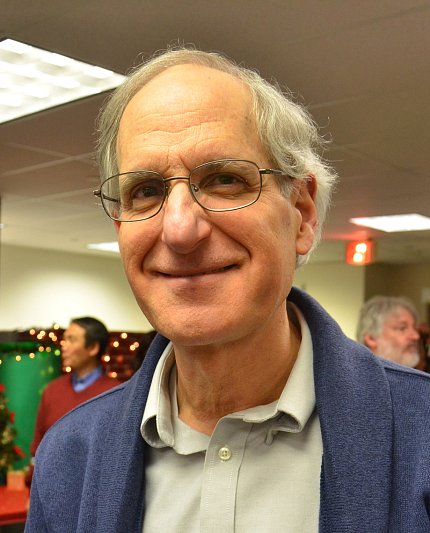CSR’s Chaitin Retires

Dr. Michael Chaitin’s last day at NIH did not go as expected when he first announced his retirement after 20 years as a scientific review officer at the Center for Scientific Review. Working at home on the last day of March during the Covid-19 pandemic, he closed his laptop at the end of the afternoon, walked into another room and announced to his wife, “I am retired.” A send-off with colleagues—via Zoom—took place earlier that day. As of this writing, he has not cleaned out his office, much less seen colleagues in person.
That anticlimax, which he acknowledged was “a little surreal,” does not reflect his career advancing the vision sciences in many capacities in and outside of NIH. Born in New York City and raised on Long Island, Chaitin majored in physics at the State University of New York at Albany as an undergraduate. However, he migrated to cell biology to undertake retina and retinal degeneration research, in part because of his own experience with retinitis pigmentosa, a genetic condition that initially affects peripheral and night vision.
Chaitin obtained his Ph.D. in molecular biophysics at Florida State University but was able to conduct his thesis work in a retina research laboratory at UCLA. He also did postdoctoral work in retina research, supported by fellowships from the National Eye Institute, in the department of pathology at Yale and at the Jules Stein Eye Institute at UCLA. His research focused on the photoreceptor cells in the retina that mediate the absorption of light and how these cells keep themselves healthy or can cause diseases that affect vision.
Chaitin served on the faculties of the University of Miami School of Medicine and the University of North Texas Health Science Center at Fort Worth. In 2000, he decided to move into scientific administration at NIH when the opportunity arose to manage what was then called visual sciences A study section, followed by other eye-specific study sections.
“Mike managed the biology of the visual system study section with exceptionally high standards for himself and his reviewers,” said Dr. Noni Byrnes, CSR director and his former division director and review group chief. “Not only was he an asset to CSR and to NIH due to his competence in review, but also he was active in outreach at the annual meetings of the Association for Research in Vision and Ophthalmology [ARVO].”
Dr. Maqsood Wani, his supervisor as chief of the cell biology integrated review group, emphasized Chaitin’s long track record of service to the vision community. “Because he was so involved, he was able to convene the highest caliber of reviewers to give the fairest reviews,” Wani said. He noted that the workshops and networking he did at the annual ARVO meetings particularly helped junior investigators.
Precautions related to Covid-19, for now, have affected Chaitin’s original retirement plans to travel and spend time with family and friends. On the other hand, his son, a journalist in Washington, and daughter, a music teacher in Prince George’s County, are temporarily sheltering in place at the family’s Rockville home. One advantage of retirement amid the pandemic: His daughter is teaching him to play the piano, something he has wanted to do for a long time.
